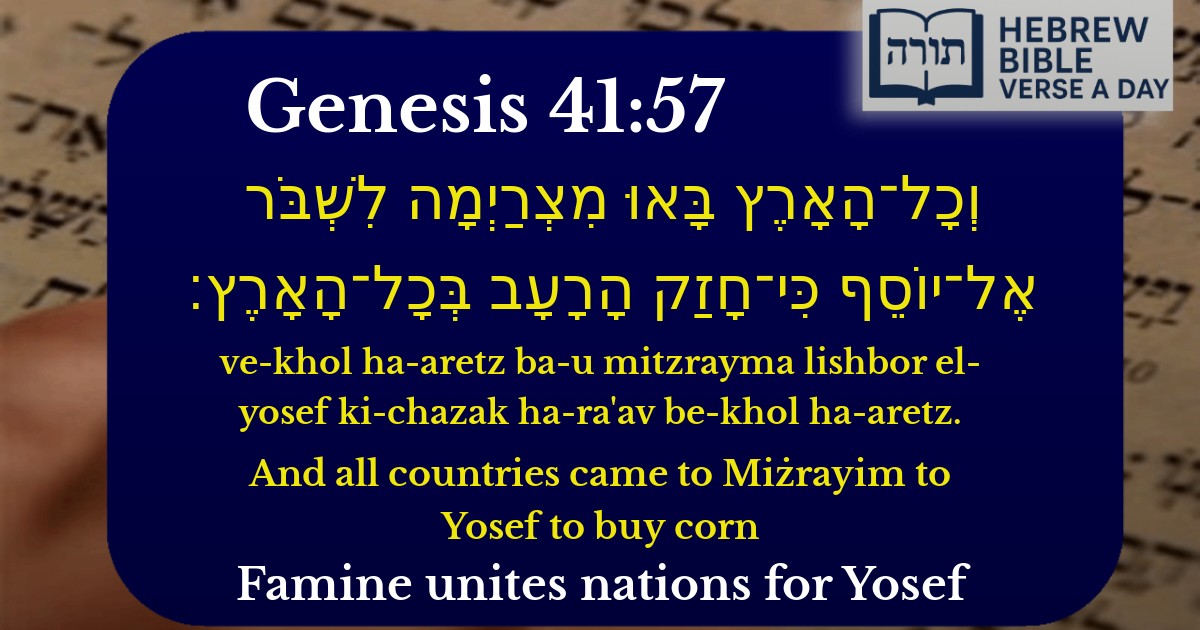Join Our Newsletter To Be Informed When New Videos Are Posted
Join the thousands of fellow Studends who rely on our videos to learn how to read the bible in Hebrew for free!
Hebrew Text
וְכָל־הָאָרֶץ בָּאוּ מִצְרַיְמָה לִשְׁבֹּר אֶל־יוֹסֵף כִּי־חָזַק הָרָעָב בְּכָל־הָאָרֶץ׃
English Translation
And all countries came to Miżrayim to Yosef to buy corn
Transliteration
Ve-khol ha-aretz ba-u mitzrayma lishbor el-yosef ki-chazak ha-ra'av be-khol ha-aretz.
Hebrew Leining Text
וְכׇל־הָאָ֙רֶץ֙ בָּ֣אוּ מִצְרַ֔יְמָה לִשְׁבֹּ֖ר אֶל־יוֹסֵ֑ף כִּֽי־חָזַ֥ק הָרָעָ֖ב בְּכׇל־הָאָֽרֶץ׃
וְכׇל־הָאָ֙רֶץ֙ בָּ֣אוּ מִצְרַ֔יְמָה לִשְׁבֹּ֖ר אֶל־יוֹסֵ֑ף כִּֽי־חָזַ֥ק הָרָעָ֖ב בְּכׇל־הָאָֽרֶץ׃
🎵 Listen to leining
Parasha Commentary
📚 Talmud Citations
This verse is quoted in the Talmud.
📖 Taanit 10b
The verse is referenced in a discussion about the severity of the famine during Joseph's time and how it affected all the lands, leading them to come to Egypt for sustenance.


The Scope of the Famine
The verse states "וְכָל־הָאָרֶץ בָּאוּ מִצְרַיְמָה" - "And all the earth came to Egypt." Rashi explains that this demonstrates the severity of the famine, which affected not just Canaan but the entire known world. The Midrash (Bereishit Rabbah 91:5) elaborates that even lands typically fertile and resistant to famine were impacted, showing this was a divinely ordained famine unlike natural ones.
Yosef's Central Role
The phrase "אֶל־יוֹסֵף" - "to Yosef" emphasizes that all nations recognized Yosef's authority and wisdom in managing the crisis. The Ramban notes that this fulfilled Yosef's childhood dreams of dominance (Bereishit 37:7-9), where his brothers and even celestial bodies bowed to him. The Talmud (Chullin 89b) derives from this that true leadership emerges during times of crisis.
Spiritual Dimensions of the Famine
Historical Context
Ibn Ezra points out that Egypt's unique ability to store grain was due to the Nile's predictable flooding patterns, making it the logical center for relief efforts. The Malbim adds that Yosef's centralized storage system (Bereishit 41:48-49) demonstrated his administrative genius, attracting nations to Egypt.